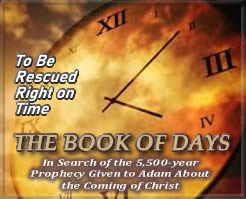Misconception #48 (Cont’d)
When the Disciples Asked Jesus When He’d Establish His Kingdom, He Said They’d Have to Wait Till the End of the Age
Since God’s first promise in The Old Testament to send a Savior to His people, there have been many aspects relating to the nature of this Coming One. Eventually, the body of literature that grew up around this tradition was such that it sometimes was in danger of getting lost in translation. Expectations, hopes, and fears all added to the difficulty of ferreting out what God intended us to know about this Person we were to expect. Centuries of tradition pit one interpretation of a biblical passage over against another. Texts were removed from their context. Distortions were repeated. But of course all of this is to be expected, right? It’s just the three laws of disinformation at work, naturally. No problem; the Lord of the Word knows how to provide a solution to cut through all the clutter.
Because God understands the tricky nature of disseminating the truth via the written word, He deigned to send numerous deliverers, messiahs, and saviors to facilitate the process. Beginning with such luminaries as Enoch, Noah, and Abraham, God raised up many great men in preparation for the eventual arrival of the One Who was to come. We know this because of early prophecies regarding a deliverer contained in extra-biblical texts like The Book of Jasher, also known as The Upright Record. According to scholars like Cyrus H. Gordon, Jasher was a literary source from which biblical authors borrowed to write their books. Proof of this, they say, is the way The Old Testament quotes from Jasher twice: First, in Joshua 10:13, and then in Second Samuel 1:18.
Story Continues Below
Says Richard Price—the founder and CEO of Academia.edu—on his podcast In Depth With Academia:
Fish Tales (From the Belly of the Whale): Fifty of the Greatest Misconceptions Ever Blamed on The Bible is:
To hear Price’s book review of Fish Tales (From the Belly of the Whale), CLICK HERE.
To hear Kent and Zen Garcia talk about correcting biblical misconceptions, from October 28, 2021, CLICK BELOW.
Story Continues From Above
Certainly anyone familiar with Scripture has heard the story of how God helped the Israelites in their battle with the Amorites. In the midst of the conflict, Joshua prayed:
“Oh, Sun, stand still over Gibeon, oh, Moon, over the Valley of Aijalon.” So the Sun stood still and the Moon stopped, till the nation avenged itself on its enemies, as it is written in The Book of Jasher.1
As it so happens, in Jasher, we find a prophecy that would have been impossible for the people of that day to distinguish whom the prophet was referring to. Even when we read it today, this prophecy can easily be understood as describing the coming of Jesus, Who was to be the Messiah. But as it turns out, this prophecy actually was predicting the life and mission of Moses, who was a messianic figure. Only through the hindsight of history, then, would mankind eventually come to a genuine realization of whom God had been speaking about in His drama of prophecy.
The disciples of Jesus fell victim to this same phenomenon. To a man they expected that all the prophecies of the Savior they’d read about their whole lives would be fulfilled in a single, glorious arrival. Promises of blessing and promises of judgment were assumed to be all rolled out into one divine lump. Only over a gradual period of time would they—and us—begin to absorb Jesus’ explanations that God’s plan of the ages was an unfolding plan. It was never God’s intention to execute His rescue effort in a single, blinding moment but, rather, was to proceed through a series of connected events, each one coming after the other, like wave upon wave rolling onto the seashore.
So, having examined some of the ways the meaning of God’s word becomes obscured, let’s discuss how The Bible helps to provide a counterbalance to the laws of disinformation.
Is there anything else in The Bible that could give us a better understanding of God’s rescue effort of the human race? Yes, Jesus told His disciples that He was providing them with His abiding “presence.” But what good would that do if the Roman Empire continued unabated? Wasn’t the Messiah, at His Coming, supposed to destroy the present world order and establish a new one? Yes, the “presence” of God was a marvelous gift. But in light of Jesus’ failure to overthrow Roman tyranny, in lieu of some future fulfillment, how could this “presence” of His be seen as anything more than some kind of consolation prize for their heroic discipleship?
Fortunately for us, Matthew wasn’t the only gospel writer who recorded the fateful words that Jesus delivered concerning the Coming of the Messiah.
According to Luke, Jesus mentioned something else during this now all-too-familiar discourse. His account records the time leading up to that enigmatic speech, when suddenly the Pharisees interrupted their discussion, demanding that Jesus tell them exactly when the Kingdom of God would be established on Earth.
Calmly, Jesus replied:
No one will ever notice the arrival of God’s kingdom simply by observing some great event. You won’t be able to say, “Look, here it is! Or look, there it is!” For you see, the Kingdom of God is within you!
Then, privately, He explained to His disciples:
The time is approaching when you’ll all wish to see the day when the Son of Man arrives, but you won’t see it. Many will tell you, “Here it is!” or “There it is!” But don’t believe them or follow them, because just as lightning flashes across the whole sky in an instant, so it will also be in that moment when the Son of Man arrives. But before that happens, He must suffer many things.2
Now, as it turns out, all of this corresponds much more accurately with the persistent teachings of Christ, who repeatedly explained His views on the nature of God’s plan of salvation for humanity. The Kingdom of God, insisted Jesus, was never supposed to be established through force of arms, as Christ’s disciples had naïvely and presumptuously anticipated. No, His kingdom wasn’t going to be one that waited for some shattering, global intrusion. It would first be established, in its fullness, via the hearts and minds of men and women of faith.
Of course, there’d be many who’d balk at this notion on the grounds that The Bible clearly speaks of a future day when Christ, as Conquering Hero, will split the sky and return to set up His kingdom once and for all. But in this rigid application of biblical prophecy, one would actually reveal the extent to which even modern believers are still susceptible to age-old preconceived notions of salvation.
As it was then, so it is today.








